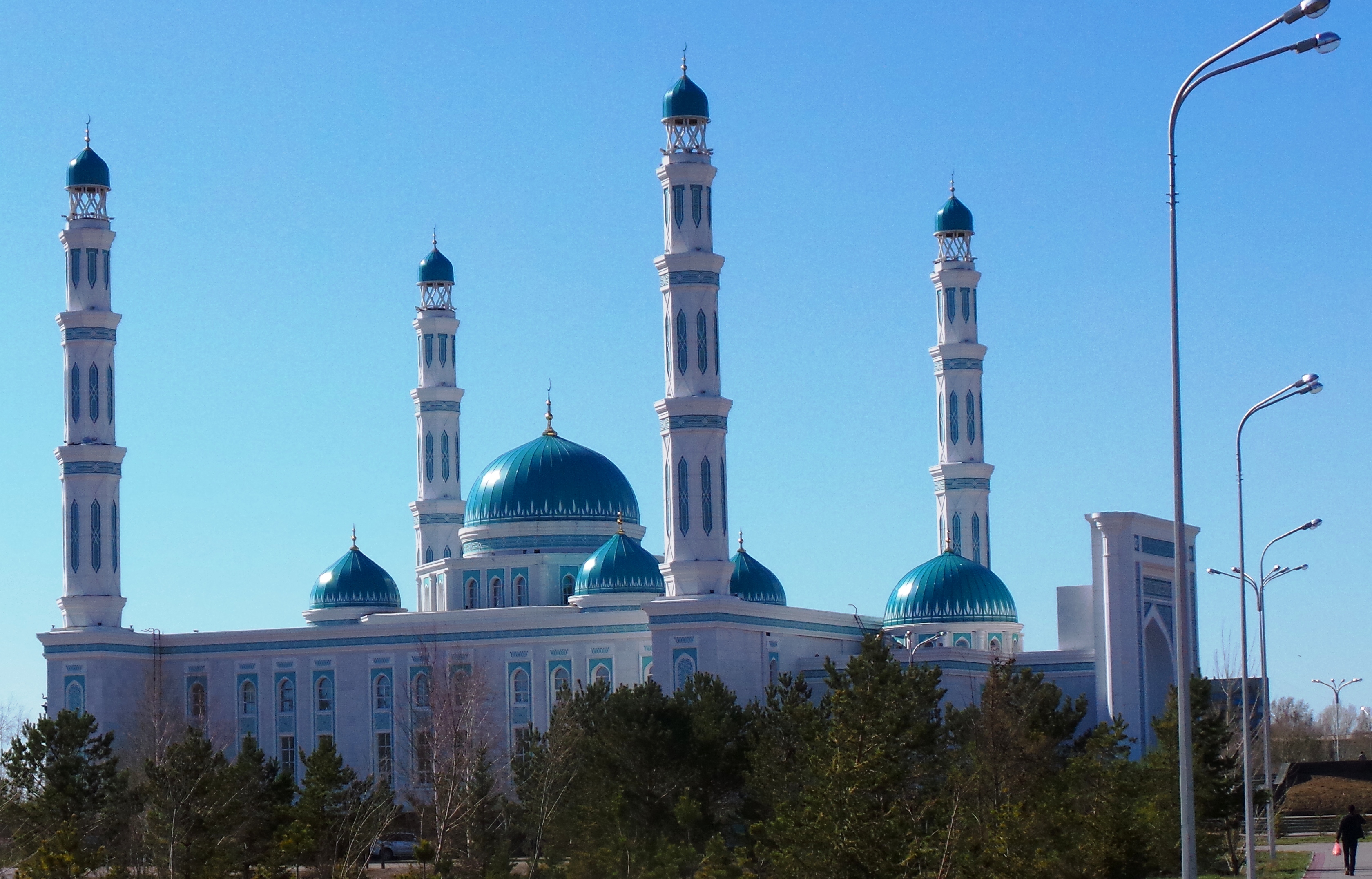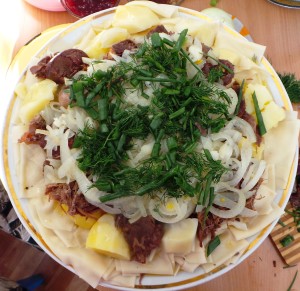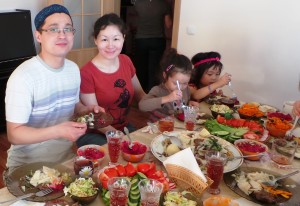FROM R.K.’S CORNER
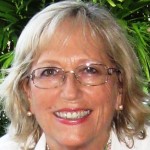
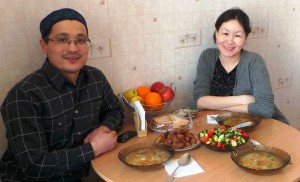 It is said that a picture is worth a thousand words. I believe it is equally true that seeing in person is worth a thousand pictures.
It is said that a picture is worth a thousand words. I believe it is equally true that seeing in person is worth a thousand pictures.
In 2003, John Macintosh, a Canadian missionary to Russia who visited our home in Florida, shared Yermek Balykbekov‘s testimony with my husband and me. A year later, I briefly met Yermek personally while in Almaty, Kazakhstan. It took, however, ten years — not until my trip to Central Asia in May – before I was able to personally see him and his family in their own home, which is located in the city of Karaganda. In the interim, we had become good friends and ministry partners thanks to modern online technology which enables us to communicate directly face to face across the globe on the screen in real time. Karaganda is located in the central part of the country which is a ten hour ride by overnight “express” train due north from Almaty.
It was fun to be among Kazakh and Russian people without any guide or translator – no one on the train spoke a word of English; on the other hand, I am not fluent in either Russian or Kazakh. The sink-and swim sense in trying to communicate and be understood without words is wonderfully challenging – I had a great time with the people on the train! Once in Yermek’s home, language was not an issue; both he and his wife are quite fluent in English.
During my three day visit I stayed with Yermek, his wife Kamazhai and their children, and was met with boundless love and hospitality. They walked me through their lives and community while introducing me to their friends, family, and church fellowship. A scrumptious celebration meal with members of their extended family who are believers in EISA (Jesus), was indeed a feast fit for a king —bountiful with many Kazakh delicacies, all made from scratch with natural ingredients!
Before you read on, you may like to familiarize yourself with Yermek’s background, testimony and ministry to his people. You will find that by clicking on the PDF Archive button on the top menu list, then scroll down to the October 2011 Bridge Report and click on it. You can also click on the following link:
https://www.bridgeinternational.org/pdf/october2011.pdf
The diverse ethnic peoples of Central Asia were oppressed for seventy years under the brutal force of the Soviet Union with demands that they conform to the Russian language and culture to find their identity as the atheist “Soviet citizen”. In 1991, when the Central Asian peoples declared their independence and established their individual national boundaries, the young generation began searching for their identity and spiritual significance.
Being rooted in Islam since the 8th century, Kazakhstan reached back, rejected the Russian influence, and declared that the Kazakhs, their language and culture were to be dominant. Although the country comprises over 100 different ethnic groups, “The Kazakhs belong to Islam and Islam to the Kazakhs”, became the slogan. It was not publicly acknowledged that there were thriving Christian communities all throughout Central Asia in the six centuries before Islam, mainly due to the massive missionary efforts of the Assyrian church. The historic fact is – Christianity was there before Islam!
The years right after the fall of communism, Kazakhstan was wide open to the Gospel, being called “The Gateway” to the other more spiritually restrictive neighboring countries. The evangelists from the West found open hearts to faith in Jesus mainly among the ethnic Russians in the country. Agape in Almaty with whom I just celebrated their 25th Anniversary as Evangelical Center, is an example of that (see last month’s report).
It continues to be more difficult to reach ethnic Kazakhs with the Gospel, as they reject Jesus, considering Him to be a Russian or American god. Another deterrent to the Gospel is a recent legislation which was passed and ratified by the President a couple of years ago, which has placed more government regulations on churches, and restricts individuals to openly share their faith in public. This restrictive law does not as readily apply to the Muslims or the Orthodox church. The new-found oil riches has lifted many out of poverty into a better life, but with the drawback that the prosperity has created a consumer society of materialism which drowns out the quest and hunger for God. In spite of all that, the young men in Karaganda flock to the magnificent-looking new mosque in the center of the city and find their identity in the resurgence of the Muslim faith. Not so many find their way to the Christian church.
YERMEK’S MINISTRY
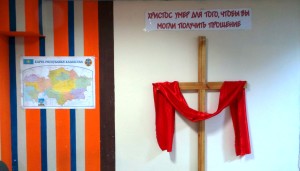 Yermek, more than anyone I know, understands the importance of presenting the Gospel so that it is relevant in the Kazakh cultural context. “We must demonstrate that receiving Jesus Christ does not mean we must forego our own culture to embrace a foreign one, but that in Him we become the person we were created to be as Kazakhs!” A three time national Champion in Marshal Arts on behalf of Kazakhstan, Yermek laid down his future ambitions when he met Jesus Christ, and returned from Moscow to his home city where he tirelessly labors to present the Christian faith to his people. For several years he pastored a growing fellowship of new believers.
Yermek, more than anyone I know, understands the importance of presenting the Gospel so that it is relevant in the Kazakh cultural context. “We must demonstrate that receiving Jesus Christ does not mean we must forego our own culture to embrace a foreign one, but that in Him we become the person we were created to be as Kazakhs!” A three time national Champion in Marshal Arts on behalf of Kazakhstan, Yermek laid down his future ambitions when he met Jesus Christ, and returned from Moscow to his home city where he tirelessly labors to present the Christian faith to his people. For several years he pastored a growing fellowship of new believers.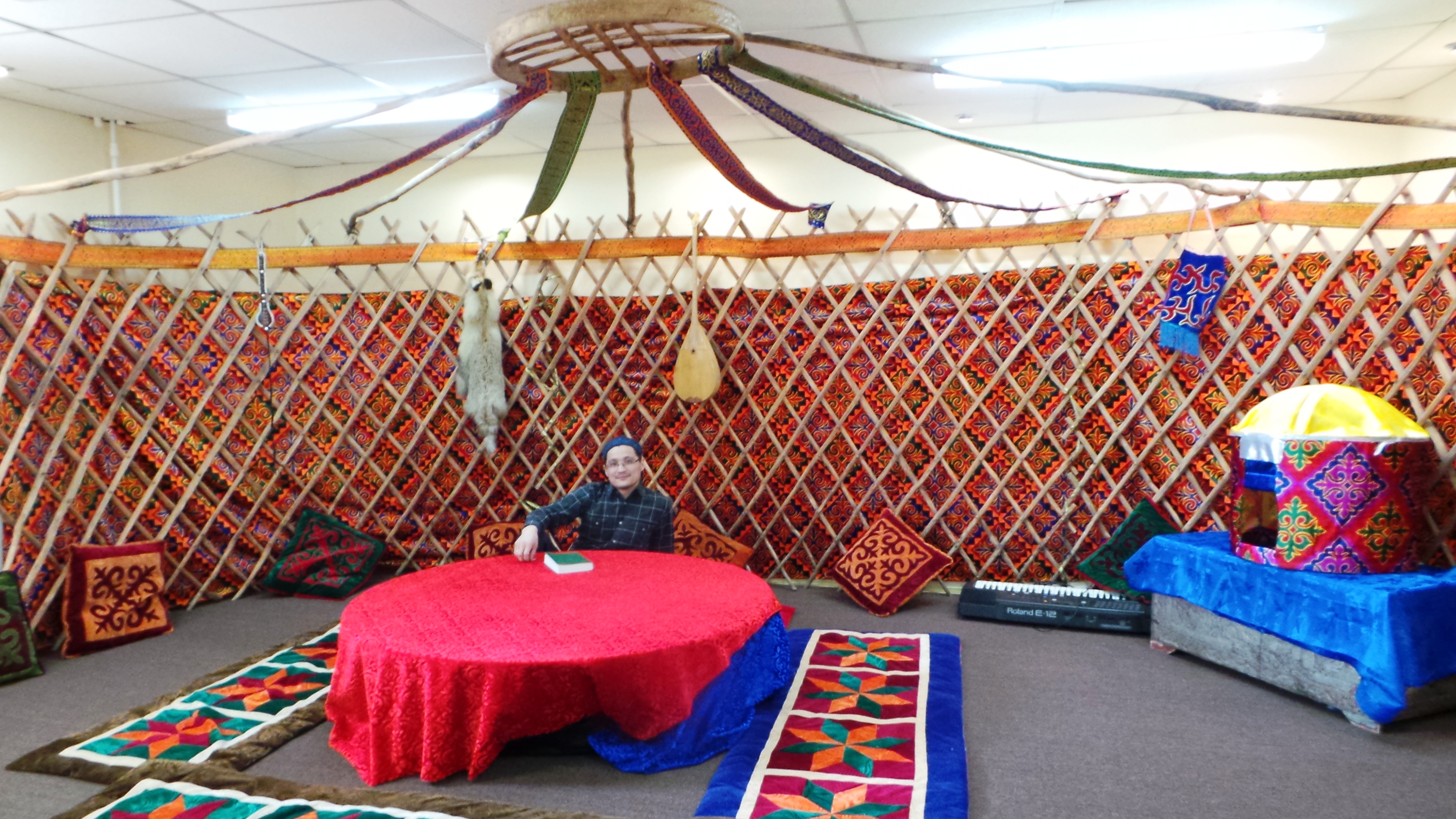 Recently, he felt called to merge his fellowship with one of the larger Russian-speaking churches in the city where he is Assistant Pastor and leader of the ethnic Kazakh believers within the church. “It is important that we understand who we are as Kazakhs in Christ, but also that we belong to and function together in love with the larger Body of Christ in the city and world-wide. We recognize that God equally loves all nations of the world.” He has been given space in the church building to decorate a large room in the Kazakh tradition where he conducts services , teaches, and trains the believers in the Word of God, using the Kazakh language. Their meetings always include food and fellowship.
Recently, he felt called to merge his fellowship with one of the larger Russian-speaking churches in the city where he is Assistant Pastor and leader of the ethnic Kazakh believers within the church. “It is important that we understand who we are as Kazakhs in Christ, but also that we belong to and function together in love with the larger Body of Christ in the city and world-wide. We recognize that God equally loves all nations of the world.” He has been given space in the church building to decorate a large room in the Kazakh tradition where he conducts services , teaches, and trains the believers in the Word of God, using the Kazakh language. Their meetings always include food and fellowship.
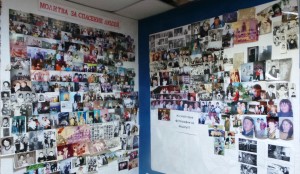 Great emphasis is placed on intercessory prayer. The prayer corner has pictures of friends and family members being prayed for. “Prayer is the very backbone of what we do together. We are now in the period of the Islamic RAMADAN. We are surrounded by Muslims who faithfully pray five times a day to Allah. Should not we as believers in Christ pray the more to our God—the author of Life?”
Great emphasis is placed on intercessory prayer. The prayer corner has pictures of friends and family members being prayed for. “Prayer is the very backbone of what we do together. We are now in the period of the Islamic RAMADAN. We are surrounded by Muslims who faithfully pray five times a day to Allah. Should not we as believers in Christ pray the more to our God—the author of Life?” 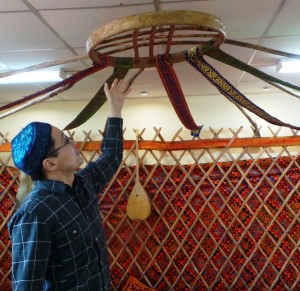 Regularly, he and a group of brothers do prayer walks in the city while proclaiming the Word of God over the people! To the left, Yermek points to the customary three intertwined strands of the circular wood that is placed at the open top of their traditional YURT, the customary movable home of the Kazakhs living the nomadic lifestyle on the steppes. He likens it to a tangible symbol of the Biblical Trinity: Father, Son, and Holy Spirit! Their national string instrument, the DOMBRA, is displayed in the background.
Regularly, he and a group of brothers do prayer walks in the city while proclaiming the Word of God over the people! To the left, Yermek points to the customary three intertwined strands of the circular wood that is placed at the open top of their traditional YURT, the customary movable home of the Kazakhs living the nomadic lifestyle on the steppes. He likens it to a tangible symbol of the Biblical Trinity: Father, Son, and Holy Spirit! Their national string instrument, the DOMBRA, is displayed in the background.
HOME AND FAMILY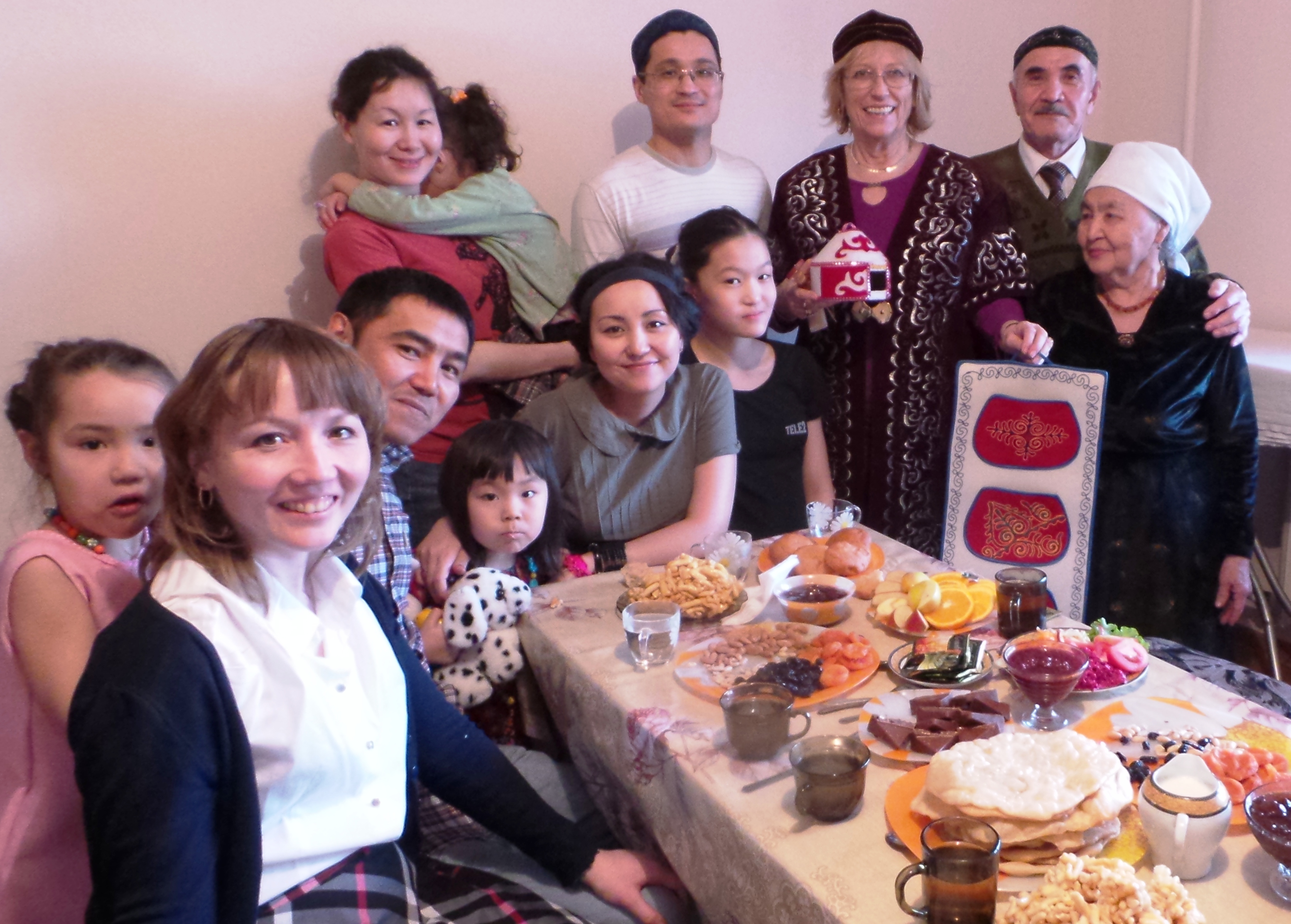 I had a delightful time with some of the believing members of Yermek and Kamazhai’s family. Hospitality with food is a hallmark of the Kazakh culture—it was quite a feast! There were a variety of dishes of all sorts – meat, vegetables, fruits, pastries – all colorful, tasty, and homemade! The main dish is the traditional Beshparmak – “Five fingers”, signifying that it used to be eaten by hand, which is horse-meat with potatoes and vegetables, seasoned with culinary spices – after all, they live along the Silk Road! After dinner, I was given extravagant gifts — a gorgeous Kazakh national costume with hat, a shawl, and miniature handmade replica of a the yurt, the Central Asian camel (which has two humps) and the Dombra.
I had a delightful time with some of the believing members of Yermek and Kamazhai’s family. Hospitality with food is a hallmark of the Kazakh culture—it was quite a feast! There were a variety of dishes of all sorts – meat, vegetables, fruits, pastries – all colorful, tasty, and homemade! The main dish is the traditional Beshparmak – “Five fingers”, signifying that it used to be eaten by hand, which is horse-meat with potatoes and vegetables, seasoned with culinary spices – after all, they live along the Silk Road! After dinner, I was given extravagant gifts — a gorgeous Kazakh national costume with hat, a shawl, and miniature handmade replica of a the yurt, the Central Asian camel (which has two humps) and the Dombra.
THE KAZAKH CULTURAL CENTER
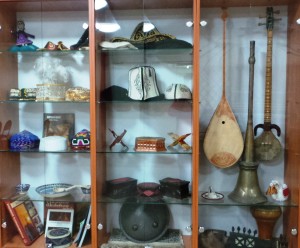
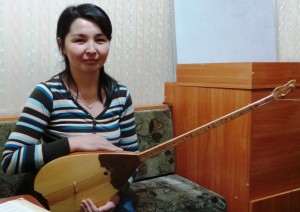 Yermek is actively engaged in The Kazakh Cultural Center downtown where both adults and young families with children are introduced to their Kazakh cultural and historic heritage. So much was lost and forgotten during the seventy years of Soviet rule when the Russian language and culture were dominant. During my visit, I was introduced to language teachers and artists, musicians, and dance teachers with many volunteers who conducted a variety of classes; the building was full of joyful activities by children of all ages. I was especially taken by the masterful playing of the national instrument, the DOMBRA, by the music teacher who was training a young girl how to play. Please watch the video below: [vimeo clip_id=101195446 width=600 height=400 byline=0 portrait=0 title=0 ] The Center is an important meeting place for the building of inter-relationships between families within the community! The glass cage above contains Kazakh artifacts still in use today.
Yermek is actively engaged in The Kazakh Cultural Center downtown where both adults and young families with children are introduced to their Kazakh cultural and historic heritage. So much was lost and forgotten during the seventy years of Soviet rule when the Russian language and culture were dominant. During my visit, I was introduced to language teachers and artists, musicians, and dance teachers with many volunteers who conducted a variety of classes; the building was full of joyful activities by children of all ages. I was especially taken by the masterful playing of the national instrument, the DOMBRA, by the music teacher who was training a young girl how to play. Please watch the video below: [vimeo clip_id=101195446 width=600 height=400 byline=0 portrait=0 title=0 ] The Center is an important meeting place for the building of inter-relationships between families within the community! The glass cage above contains Kazakh artifacts still in use today.
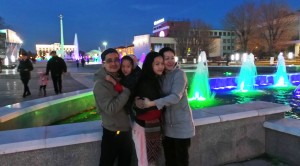 One evening, I went with the family on a walk downtown. New, impressive buildings, expansive malls, broad avenues, and beautiful fountains with splashes of colorful lights demonstrate that Kazakhstan has made the leap into the modern world and has been transformed from being known, just twenty five years ago, as the obscure hinterland of prison and labor camps for unwanted Soviet citizens to becoming a major economic and perhaps political force in today’s world.
One evening, I went with the family on a walk downtown. New, impressive buildings, expansive malls, broad avenues, and beautiful fountains with splashes of colorful lights demonstrate that Kazakhstan has made the leap into the modern world and has been transformed from being known, just twenty five years ago, as the obscure hinterland of prison and labor camps for unwanted Soviet citizens to becoming a major economic and perhaps political force in today’s world.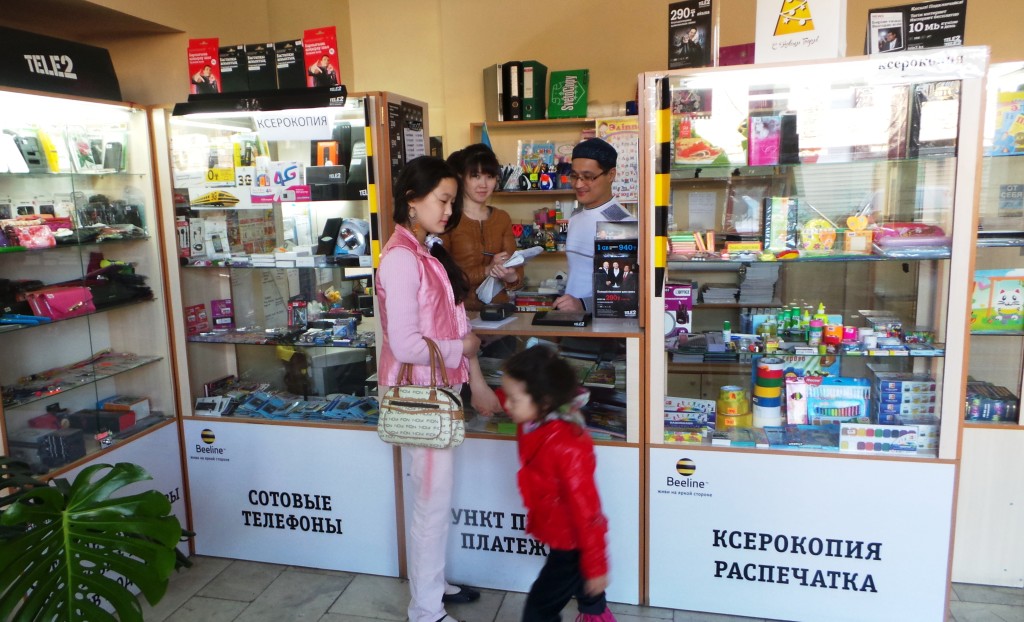 To supplement the rather meager Pastor’s salary, Yermek has opened an attractive trade spot, (kiosk) in the hallway of one of the malls downtown. Among miscellaneous personal and household items, he sells mobile phone cards and accessories. Right now it is touch-and-go, but “My goal is that, hopefully in the near future, my business will enable me to be fully self-supported as a minister of the Gospel.”
To supplement the rather meager Pastor’s salary, Yermek has opened an attractive trade spot, (kiosk) in the hallway of one of the malls downtown. Among miscellaneous personal and household items, he sells mobile phone cards and accessories. Right now it is touch-and-go, but “My goal is that, hopefully in the near future, my business will enable me to be fully self-supported as a minister of the Gospel.”
Yermek understands that if he is to effectively reach his people for Jesus Christ, he must be active and relevant both in church and in the marketplace. “We must not only preach the Gospel, we must also demonstrate it through our lives – just as Jesus did.”
We would like to raise an extra $500-$800 per month toward Yermek and his ministry. If you want to sow into his life and ministry to his Kazakh people, you may either:
Give via PAYPAL by clicking on the DONATE button above and follow instructions, or:
Write your check to The Bridge International, mark it 8342 KAZAKH WORKERS 2, then send it by postal mail to: The Bridge International, 13762 SW State Road 84, Suite 423, Fort Lauderdale, FL 33325.
If you desire to give a set amount monthly, please download the Electric Funds Transfer Form (Direct Deposit) from the DONATE page above, fill it in and send it to us with an attached void check. This authorizes us to withdraw your donation monthly from your bank account. You may also call me and give your EFT information over the phone: +1-954-916-0521.
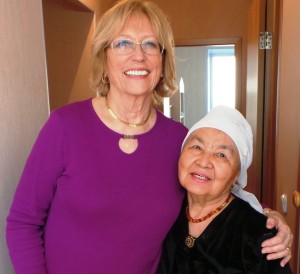
Two sisters — different ethnos, cultures, languages, backgrounds and outlooks on life—yet one in heart and spirit through Jesus Christ.

